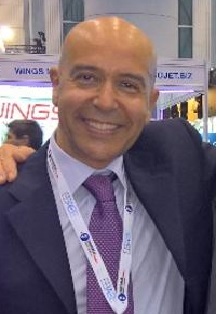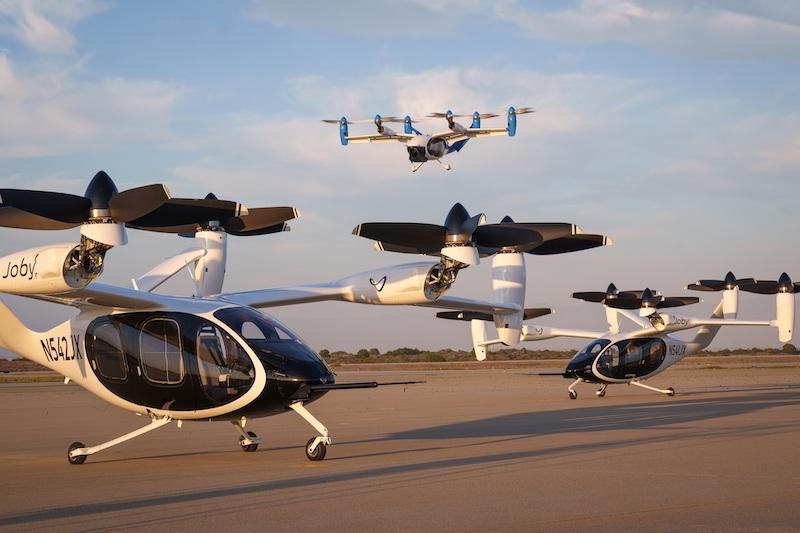Toyota Boosts Investment In Joby By $500M To Support Electric Air Taxi
Details
More Products & Services
Products & Services
Home - Aviation Group Marketing
Aviation Week Network
120 data points on over 156,000 commercial and business aviation aircraft, including military transports. Discover the most trustworthy resource for the complete aircraft history, plus ad hoc reports, month-over-month trend analysis and details on expected deliveries through 2050.
Aerospace | Aviation Week Network
Aviation Week Network
https://aviationweek.com/themes/custom/particle/dist/app-drupal/assets/awn-logo.svg
People

Andrea Rossi Prudente
Aviation Week Network

Becca Balmes
Aviation Week Network

Belinda Tan
Aviation Week Network

Brian Everstine
Aviation Week Network
Editor

Eddie Krankowski
Aviation Week Network
Assistant Manager, Tradeshows

erving dockery
Aviation Week Network

Lisa Tan
Aviation Week Network
Senior Marketing Manager

Mark Thomas
Aviation Week Network
Description
Japanese automaker Toyota has agreed to invest an additional $500 million in Joby Aviation, with the funding to support certification and commercial production of the U.S. startup's electric air taxi. The companies also plan to establish a strategic manufacturing alliance to scale production of the aircraft.
When finalized, the additional funding will take Toyota Motor's total investment in Joby to $894 million and strengthen its position as the largest external stakeholder in the electric vertical-takeoff-and-landing (eVTOL) developer. This does not include an initial investment made by Toyota Ventures in 2017.
“We've been working with Toyota for seven years, and we've built that relationship in a step by step way,” says Joby founder and CEO JoeBen Bevirt. “It began with the Toyota Ventures investment, and then the Toyota Motor investment and then with Toyota providing engineers that have been working shoulder to shoulder with the Joby team in California.
“Then we signed the supply agreement where Toyota is manufacturing parts for some of our systems. And now this investment, which will come in tranches. I think it signifies the increasing commitment and collaboration between Joby and Toyota,” he says, adding the companies share a “deep passion and excitement for this new form of mobility.”
The new investment is planned to come in two equal tranches, with the second tranche subject to the finalization of terms related to the strategic manufacturing alliance, details of which will not be released until next year, Bevirt says. The first tranche is planned to close this year, and the second in 2025.
Automakers are major backers in two of the leading U.S. eVTOL developers—Toyota with Joby and Stellantis with Archer Aviation. In addition to investing in Archer, Stellantis in August agreed to contribute up to $390 million to help scale Archer's eVTOL production by covering manufacturing labor costs as well as certain capital expenditures at its Georgia manufacturing facility through 2030.
Toyota engineers are working with Joby at its Marina, California, pilot production plant, providing help with process planning, manufacturing method design and tooling design. Toyota will also be involved with Joby's first scaled production plant, under construction in Dayton, Ohio, Bevirt says.
“Toyota is one of the most respected companies in the world when it comes to manufacturing large, complex systems with incredible quality and reliability. As we look to scale aviation manufacturing to a level that hasn't been seen in decades, or ever, we are excited about having Toyota at our side,” he says.
Powertrain and actuation components produced by Toyota are being delivered to Joby's production line “and that has really showcased the spectacular quality and consistency with which they manufacture,” Bevirt says. “It's exciting to see them making really high-quality, conforming aviation components.”
The new investment will take the total funding raised by Joby to nearly $2.8 billion, almost a third coming from Toyota. Joby ended the second quarter with $825 million in liquidity, the highest in the industry. “The additional $500 million should see them through 2027, maybe early 2028, including production ramp-up and entry into service,” says Sergio Cecutta, partner in SMG Consultancy.
“We had fantastic runway before and will always be working to have a healthy balance sheet and to stay well capitalized so that we can grow the business in a forward-looking way,” Bevirt says.
“We've always choose to be proactive and ensure that we are the best capitalized company in the industry,” he adds. “And this is another example of that, where we have the opportunity to work even more closely with Toyota and ensure that we have a balance sheet to run the company focused on making the best possible strategic choices and growing the company with a long-term view.”
Maintaining strong liquidity has taken on increased importance as the eVTOL industry experiences development delays. Joby has seen FAA type certification slip to the end of 2025 but has yet to fly a conforming prototype with which to begin for-credit certification flight testing of its S4 eVTOL.
“We are focused on commercial operations in Dubai next year,” Bevirt says. “We're pleased with the progress we're making with the FAA ... But there's still a lot of lot of work to be done on certification. We have a great working relationship with the [General Civil Aviation Authority of the United Arab Emirates]. We and they are leaning in. I am optimistic on that front.”
When finalized, the additional funding will take Toyota Motor's total investment in Joby to $894 million and strengthen its position as the largest external stakeholder in the electric vertical-takeoff-and-landing (eVTOL) developer. This does not include an initial investment made by Toyota Ventures in 2017.
“We've been working with Toyota for seven years, and we've built that relationship in a step by step way,” says Joby founder and CEO JoeBen Bevirt. “It began with the Toyota Ventures investment, and then the Toyota Motor investment and then with Toyota providing engineers that have been working shoulder to shoulder with the Joby team in California.
“Then we signed the supply agreement where Toyota is manufacturing parts for some of our systems. And now this investment, which will come in tranches. I think it signifies the increasing commitment and collaboration between Joby and Toyota,” he says, adding the companies share a “deep passion and excitement for this new form of mobility.”
The new investment is planned to come in two equal tranches, with the second tranche subject to the finalization of terms related to the strategic manufacturing alliance, details of which will not be released until next year, Bevirt says. The first tranche is planned to close this year, and the second in 2025.
Automakers are major backers in two of the leading U.S. eVTOL developers—Toyota with Joby and Stellantis with Archer Aviation. In addition to investing in Archer, Stellantis in August agreed to contribute up to $390 million to help scale Archer's eVTOL production by covering manufacturing labor costs as well as certain capital expenditures at its Georgia manufacturing facility through 2030.
Toyota engineers are working with Joby at its Marina, California, pilot production plant, providing help with process planning, manufacturing method design and tooling design. Toyota will also be involved with Joby's first scaled production plant, under construction in Dayton, Ohio, Bevirt says.
“Toyota is one of the most respected companies in the world when it comes to manufacturing large, complex systems with incredible quality and reliability. As we look to scale aviation manufacturing to a level that hasn't been seen in decades, or ever, we are excited about having Toyota at our side,” he says.
Powertrain and actuation components produced by Toyota are being delivered to Joby's production line “and that has really showcased the spectacular quality and consistency with which they manufacture,” Bevirt says. “It's exciting to see them making really high-quality, conforming aviation components.”
The new investment will take the total funding raised by Joby to nearly $2.8 billion, almost a third coming from Toyota. Joby ended the second quarter with $825 million in liquidity, the highest in the industry. “The additional $500 million should see them through 2027, maybe early 2028, including production ramp-up and entry into service,” says Sergio Cecutta, partner in SMG Consultancy.
“We had fantastic runway before and will always be working to have a healthy balance sheet and to stay well capitalized so that we can grow the business in a forward-looking way,” Bevirt says.
“We've always choose to be proactive and ensure that we are the best capitalized company in the industry,” he adds. “And this is another example of that, where we have the opportunity to work even more closely with Toyota and ensure that we have a balance sheet to run the company focused on making the best possible strategic choices and growing the company with a long-term view.”
Maintaining strong liquidity has taken on increased importance as the eVTOL industry experiences development delays. Joby has seen FAA type certification slip to the end of 2025 but has yet to fly a conforming prototype with which to begin for-credit certification flight testing of its S4 eVTOL.
“We are focused on commercial operations in Dubai next year,” Bevirt says. “We're pleased with the progress we're making with the FAA ... But there's still a lot of lot of work to be done on certification. We have a great working relationship with the [General Civil Aviation Authority of the United Arab Emirates]. We and they are leaning in. I am optimistic on that front.”

Share
Recent Chats
Share via email
Future: handle WhatsApp here
Future: handle LinkedIn here
Future: handle Twitter here
SUBMENU HERE
Share via Chat
Copy Link

